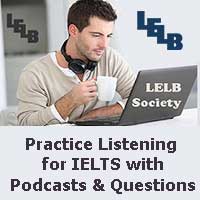IELTS Listening Practice Memory Improvement
IELTS Listening Practice Memory Improvement
About this activity
- This activity is labeled round table by Dr. Hariri, the creator and administrator of LELB Society.
- This activity is on the premise of Flipped Learning, according to which the students watch a video before the class, carry out research into the selected theme, and prepare themselves for an informed discussion in the class.
- This activity is on the basis of both synchronous and asynchronous computer-mediated communication (CMC), according to which the students are also encouraged to be active even before the class.
- In this flipped classroom activity, the students are encouraged to utilize the comment form at the bottom of the post to to exchange their questions, findings, and experiences with each other. Later on, we will discuss the asynchronous activities in the class. In a few words, “let’s learn from each other.”
About the Video Files
- The video files are meticulously selected among the most prominent academicians, lecturers, and scientists based on Google Scholar.
- We might refer to the exact elapsed time ⌛️ of the video files to pinpoint specific statements, messages, etc.
Writing Activity
- You should adopt a formal register in your written contributions in the comment form.
- To give an answer to a question or comment, use the Reply button.
- In our written activities, we can practice negotiation of meaning (sharing our findings with regard to the selected themes) and negotiation of form (performing peer-reviewed error correction).
- Put a number before your questions in the comment form successively to refer to them more easily in the class.
- Your questions should be unique and not previously raised by your classmates in the comment form.
Expectations
- You should take equal turns in speaking. The maximum amount of time you can have is 60 seconds.
- This is a fully organized activity; consequently, all your contributions, including comments, replies, and verbal opinions, must be with direct reference to the assigned topic and its corresponding video. Any irrelevant contribution is strongly frowned upon.
- You will be stopped if your speech appears to be irrelevant or not supported by evidence.
- Students leaving comments below will be given priority over others in our informed conversations.
IELTS Listening Section
For each of the four parts, you will be given some time to look over the questions and check your answers.
You are given an extra 10 minutes to write down your answers on your answer sheet.
Each of the 40 questions brings you one mark.
For the candidates with physical disabilities, some modifications might be considered, for example, the question items might be available in Braille. However, you should contact your IELTS center and inform them about your special condition in advance.
Instructions for the IELTS Listening Part
In this part of your exam, you will be given some instructions as the following:
- Do not open your question paper until you are told to do so.
- Write your name and your candidate number on the specified space on top of this page.
- Listen closely to the instructions for each part of the paper.
- Write your answers to the questions on the questions paper while you are listening.
- At the end of the test, you will have an extra 10 minutes to transfer your answers to a separate answer sheet. Use a pencil to copy the answers.
Section 1
In this section, you will listen to a conversation between two speakers on an everyday and comment topic, such as organizing events, arranging a trip, talking about the weather, etc. You are supposed to listen closely to get specific factual information.
Section 2
This is a monologue on a general topic, such as public events. Again, you are supposed to listen closely to acquire specific factual information.
Section 3
In this section, you will listen to a discussion between 2 or 4 speakers on an academic topic, such as assignments, taking courses, attending seminars, etc. While focusing on specific factual information, you should also pay attention to the speakers’ attitudes and opinions.
Section 4
In this section, you will listen to a lecture (monologue) on an academic topic. You should focus on specific factual information as well as the main ideas. Also you should pay attention to the speaker’s attitudes and opinions.
You will have around 30 seconds before the test starts to see what kinds of information will be required (for instance, names, dates, times, money, etc.)




What are the number brain exercises that skyrocket our concentration?
7. What are the number brain exercises that skyrocket our concentration?
Hello Dr Hariri and appreciate for embedding such useful video.
I myself have had some experiences with 2 solutions -those the video has mentioned- to memorise new words: by utilising tape recorder and listen to it several times. Despite memorising those new terms, I learn how to accents and pronounce them which make me more confidente in communications.
The second one is visualising. When I see a movie or play, it is easier to memorise words. Because during the show, I encounter with several parts that make the show spectacular such as playing, music, costume, stage design, singing, etc. Each of these could help me to remember the content of the show. Even though I forget dialogues, I can remember the content and the picture, and I need to search through dictionary to find it. It means, at least I interpret the meaning and am not zero. By this, I won’t forget the king’s speech once the king has hiccups due to visualising his picture during the movie.
Generally, for me, it is not easy to memorise new words. I need to repeat and hear them a lot. These are only my experiences that I thought to share with you.
Thank you
Hi dear @Mojgan. I’m glad you’ve liked the video.
Using a voice recorder can also give you this exceptional chance to evaluate your own language products, in terms of intonation, pronunciation, etc.
About watching movies, I do agree with you because; on the other side, you automatically develop empathy with the characters of the story, which per se facilitates learning and memorization.
In sum, great experiences! Thank you so much for sharing them with us.
6. What is the meaning of cheerios?
5. Why is not force memorization effective?
4. What is interference topic technique?
It is switch attention from one topic to another.
3. How nail words could help people to recall things?
This technique is to nail one learn thing to another
Corrections:
to nail one thing to learn to another
2. How can you make use of the serial position effect?
As I understood by the serial position effect I need to highlight words in abstract and conclusion more than middle parts. Do I get it right?
recall instead of highlight
Actually, this technique refers to learning the most important information initially and at the end of any memorization effort because our brains function much better at these specified time periods.
Well, not exactly. In fact, serial position effect simply puts the spotlight on the very beginning and end of what you are learning. As a result, you should prioritize the most important information to digest and try to learn it at the outset and end of any learning cycle.
1. Why do we forget things?
First of all, to learn new languages we need to plant new words and play with them in different dimensions such a kid. Cultivate novel ideas and let them grow to our mind. Touch new lifestyle and study about them. But the most important thing is that as Ibn-e-Khaldoon in 5th century said “to learn new language you have to be in that situation” (recited from my memory during education.
Sorry, I am English learner like you. your question reminded me why I forget new words? and made me write these words.
That’s exactly true. When it comes to language learning, you have this privilege to use the language practically when you live in a place where the language is spoken by the majority of the people. That is also the difference between “second language” and “foreign” language learning. The former refers to learning another language apart from your mother tongue in a context where the language is spoken in the society and not necessarily in the class. However, in the latter, the language is only spoken or practiced in academic or educational contexts, such as classes.
Thank you for explanation. I would like to know more about these differences if it is possible.
Certainly. You might find the information on this post useful:
https://lelb.net/second-language-acquisition-tesl-issues/
Our brain has a limit space for storing information so it protect us from overloading information and eliminate information that not use frequently.
Corrections:
* Limited space
* it protect”s”
* that not use frequently :arrow: that is not used frequently